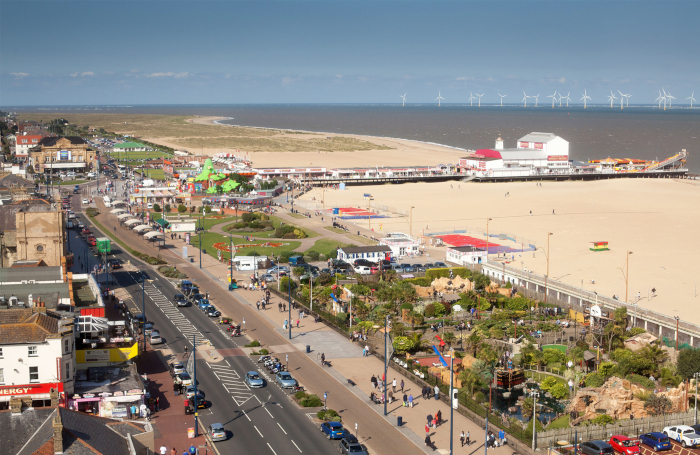The commission
To undertake an urban design/historic analysis and develop a public realm improvement feasibility study for the seafront.
The critical challenges and opportunities to address in the process and output are:
- making the most of existing heritage and culture, and minimising blight to the public realm to improve the quality of the built environment
- drawing on relevant best practice examples from elsewhere (UK, Europe, and beyond)
- establishing Great Yarmouth as the national centre of excellence for marine science and renewable offshore energy as the basis of the future ‘brand’ identity and economic growth
- embedding opportunities for creatives and communities to engage in the process of story-telling/interpretation, co-design, commissioning, and delivery to influence the look and feel of spatial regeneration to encourage local ownership
- maintaining vibrancy and activity, while rationalising the seafront retail offer - making better use of space currently available for cultural and social congregation and creating spaces within the public realm for food and beverages, events, and festivals that celebrate local culture and heritage
- taking into account the analysis and principles set out in Corporate Plan, Core Strategy, Emerging Local Plan, 2017/18 Annual Monitoring Report, Conservation Areas, Culture Strategy, the Tourism website and Tourism Strategy.
- creating a context in which investors have confidence to support wider growth, regeneration, and resilience ambitions
- working in collaboration with the local authority as client, presenting ideas and findings to the Future Place programme
The final output
The final output will take the form of an urban design/historic analysis and an illustrated public realm improvement strategy for the seafront. The strategy will include the vision and objectives for the area, and will also set out the design principles, timeline and implementation process (which might include the appointment of a consultant team or assembly of an expert panel). It will also include an initial intervention or actions required to kick start the process.

Background
As England’s established offshore energy sector capital, Great Yarmouth is at the forefront of £39 billion in energy investment over the next 20 years, including in large-scale offshore wind. With a flagship tourism economy worth more than £625 million each year, Great Yarmouth is also Norfolk’s top seaside resort, boasting a rich cultural heritage including historic buildings and diverse events. Like many coastal areas, however, the area also faces several challenges, including pockets of social deprivation, low wages, decreased land values, poor health and education. In order to address these complex challenges for communities, while maximising the opportunities for investment, the Council takes a place-based approach to planning and delivery, working closely with partners across public and private sectors to advance a range of exciting work to support regeneration and inclusive economic growth.
Vision
Great Yarmouth’s vision is to encourage economic growth by attracting and retaining further visitors and skilled workers, including regenerating the historic town centre and better aligning the tourism, culture, and heritage offers with the future of the town as the national capital for offshore energy. The Council would like to create a vibrant inclusive, mixed-use seafront that enables the celebration of local culture, heritage, and innovation.
Next steps for Great Yarmouth
The Council is currently driving forward an ambitious Town Centre masterplan and major regeneration projects along the seafront, in addition to crafting a Culture and Tourism Strategy to help broaden and enhance the tourism offer. The Council is also lobbying for a bespoke housing deal for Great Yarmouth. The Future Place programme will help Great Yarmouth to help optimise, amplify, and advance these initiatives.









